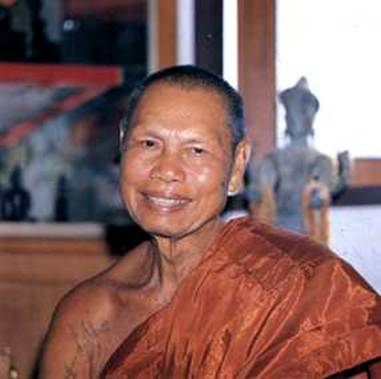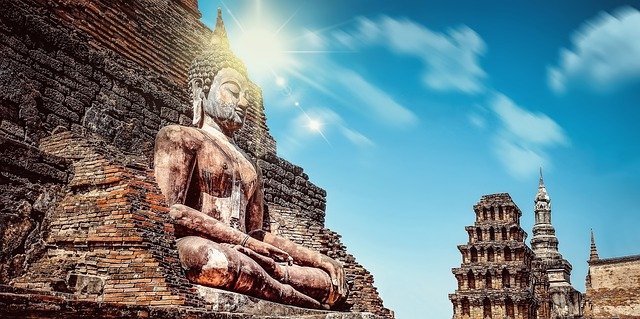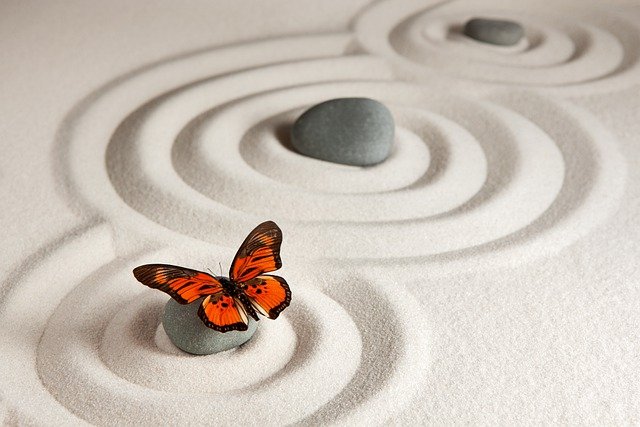Utterances of the Most Ven. Phra Sangwahn Khemako
The Buddha, the Dhamma, and the Sangha point the way to know
suffering, to understand suffering, and to transcend suffering through
practice.
The teachings of the Blessed One are very precious. The one who honors
the Dhamma will penetrate into truths of the body and the mind. This we
call a practioner who follows in the footsteps of the Exalted One.
The Dhamma is always “at stake”. If I live as if my life was “at stake”,
then I may triumph over myself. Now the person who doesn’t seek to
conquer others, but only himself – without fail – is truly a child of the
Buddha.
The Dhamma is the mechanism for helping us to escape from suffering.
What greater unsatisfactoriness is there than old age, sickness, and
death? It is to not know that the Dhamma is the means, which prevents
people from falling into worlds of evil.
The Buddha, the Dhamma, and the Sangha are mighty powers. When in
an emergency situation, they will help you. The pathway to heaven is by
respecting what is righteous. Conversely, by disrespecting what is good,
this will lead us to hell. We shall reap whatever we have sown. It all boils
down to our mindfulness.
We can only live one day at a time. Therefore, we should act with virtue,
with mindfulness, and in accordance with the teachings of the Buddha.
Our lives are finite. What is it that we should endeavor in? To honor the
Buddha, the Dhamma, and the Ariya Sangha (Noble Ones) as our guides
and refuges. By often honoring them, eventually greed, anger, and
delusion will disappear.
A student of the Blessed One must make a concerted effort to not
cultivate dishonesty if he seeks victory over himself. Triumphing over
evilness exists within ourselves so long as we can overcome our
defilements. Then freedom from unsatisfactoriness is possible.
If one, before meditating, intends to understand hell, then after seeing it,
he won’t endeavor in that way. Hell is a most unfortunate state. So one
who has never seen it or does not know suffering, will really not be able
to understand and his heart will become completely withered.
We must prepare ourselves with morality and virtue. Training our own
hearts is much better that imposing upon others. Don’t worry if we are
hard on ourselves.
Path, Fruition, and Nibbana are possible if we persevere in the practice of
mindfulness of breathing: know where it enters and how it flows.
To be successful, a meditator must practice. He must be mindful when
lying, standing, and walking. Should he let his guard down, then
afterwards, he should properly reflect upon his lapse and determine to
re-establish his mindfulness.
When we become intimate with the teachings of the Blessed One, we will
not get angry or do evil deeds. We will simply practice. However, if we
don’t train ourselves, then we can’t know ourselves. When we were
children, we didn’t know who we were. We needed to rely on teachers
and it was through their teachings that understanding became possible.
We must practice to know ourselves. It is not necessary to become
acquainted with others’ stories. Others must know their own stories. And
our stories are ours, not theirs. By acting in this manner, freedom from
suffering is possible.
What does another say? We should trust what they say and not use our
own opinions because it’s the most convenient thing to do. Forgive
others. This is much more noble than relying on our judgments and it
also washes away unwholesome acts. Forgiveness is a potent virtuous
action.
Don’t hold onto or grasp at the pleasant words of another; we can end
our defilements by acting in this way. As for unpleasant words spoken: at
that very moment, just forgive whatever is said. This is the way of skillful
conduct.
If one speaks nonsense to me, let not anger arise. Should he shoot an
arrow and kill me, allow the pain to transform into something sweet; into
something edible. With forgiveness, I can let go. By letting go, wellness
arises. With wellness, I am triumphant.
When another is malicious, remain still. By remaining calm, he will
become still. With mutual respect, righteousness will prevail. Freedom
from suffering is possible by acting in such a way.
Taking what is not ours usually produces anger in people. We must
remain calm; just don’t mind. If we lose our composure, then fire arises.
When the fire burns, so to does the dry grass. We will never understand
ourselves. If we let anger arise, we have become an infected person.
Through practice we will become familiar with the origins of the fires of
anger. Then we can determine to wash them away. A meditator must
persevere in knowing the roots of anger in order to gain freedom from
himself.
When we allow anger to manifest, we lose the tranquility in our hearts
and our progress is hindered. By allowing the mind to rest in its natural
Buddha essence, then anger may be quelled.
If we shoot a small arrow at a baby elephant, it will not die because its
skin is thick. Likewise, meditators, by using patience in all situations, will
not utter improper speech. With perseverance, they will have equanimity
whether faced with pleasant or unpleasant things.
With forgiveness and awareness, when mindfulness is lost, we don’t have
to fall into a state of anger.
We can become intimated with self-release by building-up our
virtuousness. Virtue has a great power and it allows goodness to
permeate all the things we do.
When there isn’t enough Dhamma present, we will only have attachment
and aversion. If we subdue our attachments and aversions, then
discriminative knowledge will arise; sharp intelligence will manifest.
However, if we cannot quell them, then we will be obstructed from the
front and the back and wisdom will never materialize.
There is no mara (destroyer of goodness) greater than delusion. When
delusion is present, we don’t fear our maras. We must put a halt to this
way of thinking. Having fear of the maras means that delusion cannot
hold sway.
Morality and respect work in tandem. They are like doors, which allow
water to flow freely. How the water flows depends on who the
doorkeepers are. If the doorkeeper has virtue, then all the defilements
can be washed away. Without virtue, the doorkeeper is tainted and the
water can only flow into the abyss.
People without the Five Precepts do not have a true shelter.
With integrity, escape from the clutches of suffering and hell are possible.
That person who consistently maintains his precepts will have
concentration and tranquility. He will likely gain steam-entry in time.
Is there any precept that isn’t necessary? No, there isn’t. They are all
necessary. Virtuousness is like a resplendent jewel that shines brilliantly
inside the heart. It allows meditators to see and to know. This is the
supreme happiness.
By maintaining the Five Precepts, goodness will be present. With
goodness, you will know how to practice. Upon death, it is certain that
you will go to that Deva (celestial being) realm that accords with your
merit. Eventually you shall reach Nibbana (liberation).
If we have the Devas (celestial beings) within our hearts, they will protect
us. They will support us because we maintain proper conduct and proper
speech.
If we practice right speech, then we will progress in the Dhamma.
Conducting oneself properly at this very moment means that wellness
exists in body and mind.
Know that doing evil is the pathway to hell. Know that doing good is the
pathway to heaven, to Nibbana (liberation). A joyful heart dwells in the
teachings of the Blessed One.
The Buddha has taught that when the attachments arise in our
meditation practice, treat them like our friends birth, old age, sickness,
and death. They will help you see suffering and be released from it.
Suffering and happiness can be compared to the head and tail of a snake.
If we go to grab its head, it will bite us. If we go to grab its tail, it will
bite us. We must make an effort to clearly know that suffering and
happiness will always bite us, no matter the position we are in.
Persist in seeing what is good, in seeing what is evil. Persistence allows
for the releasing of unskillful actions and for the arising of bliss to occur.
With the Triple Gem established in our hearts, together we can practice
until we become Stream-enterers; until we become Arahants. In this way
will all be liberated.
If we have the mindset that happiness exists all the time – all day and all
night – then we will likely think that no fever or sickness equates to
happiness. Actually, this is suffering. Heed-lessness drags us down all the
time. Sickness drags us down all the time. Death drags us down all the
time. Please refrain from being negligent!
When we really understand the true nature of things, then when there’s
sickness, we know it. When there’s death, we know it. How must we act?
We must always look inside and find refuge in our hearts until we know.
Forsake evilness and let go of the hold on aging, sickness, and death. By
reflecting on the fact that death is certain, letting go of evilness becomes
possible. By stopping unwholesome actions, happiness will manifest.
My parents and grandparents have all passed away. I’m the only one left
and I will also surely die. I have always known this. Now, make haste in
purifying your deeds and your hearts.
We often think that the person who leads us astray can’t really help
us. The forest masters have taught otherwise: learn from all. The forest
masters do not teach conventional wisdom.
Bhikkhus, refrain from negligence! Just try to prepare yourselves in body
and in mind. The Buddha has taught that you don’t have to doubt what’s
in your hearts. Your doubting is not real. Just worry about practicing with
much virtuousness.
To speak truthfully. To act more truthfully. This is how I should train
myself.
Whether a meditator is standing, walking, sitting, lying down, drinking,
eating, speaking, or thinking, he should persevere in restraining the
sense doors [seeing, smelling, hearing, tasting, touching, and thinking].
By keeping the precepts, he will possess much self-control.
What does morality mean? It means restraining our thoughts, words, and
deeds. These are wholesome actions. What is samàdhi? It is the
preserving of a stable heart. With a stable heart, we will come to
understand the roots of our volitional actions. This is akin to acting
wisely. How can we become a Noble One? By subduing the senses
through self-restraint.
I have a lot of experience with practicing in a cemetery. When the mind is
unstable, bhikkhus, you must set your mind on calming the heart. In this
way will you know what is truthful. You must remind yourself thus, ‘with
an unstable mind I cannot know what is truthful.’ I implore you to follow
this guideline. When training your mind, you don’t have to contemplate
much. Just reflect that when the mind is not calm, you will not know
what is truthful. Grasp onto this idea every single day. Hold onto to this
practice every time you meditate. Always train in cautioning yourself.
Upon ordination, meditators must radiate mettà (loving-kindness) onto
others. They must refrain from oppressing others, whether physically or
verbally. Oppression is not good. If we don’t like another person, or if we
think that person is bad for whatever reason, then it’s likely that we’ll try
to suppress them. Don’t use such gross behavior because it’s the
pathway to hell. If we don’t use such behavior, then we’re on the
pathway to heaven and Nibbana (liberation).
An ordainee must observe the Four Brahmavihàra [loving-kindness,
compassion, sympathetic joy, and equanimity] and train the mind in that
direction. See others as a brother or sister who came from the same belly
as you. Refrain from suppressing others, whether physically or verbally.
This is what being moral means. However, if you are prone to abusing
others, hitting others, or quarrelling with others, well, surely this is hell!
Monks adhere to the Vinaya (monastic code of behavior). The Vinaya
cultivates confidence, but not like it has to be shouted out. If a monk has
goodness, then he has good virtue, good samàdhi (concentration/
tranquility) good Vinaya, and good wisdom. In fact, he acts with
goodness in all things. The one who admires virtue will speak according
to the Dhamma. But when morality is not favored, then samàdhi will not
be good and the Vinaya not good. In fact, he will not do goodness in all
things. He who extols strife is an ill person.



